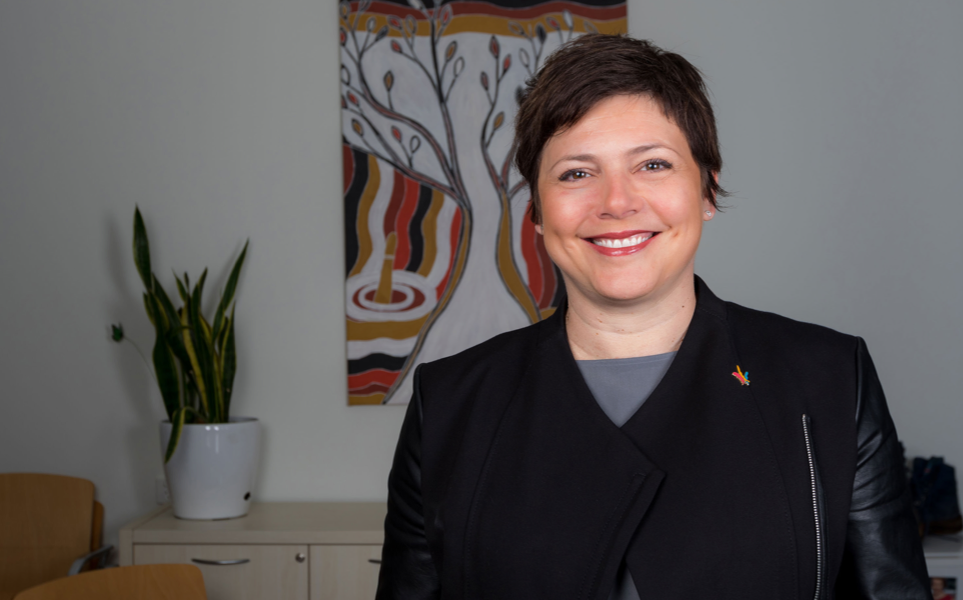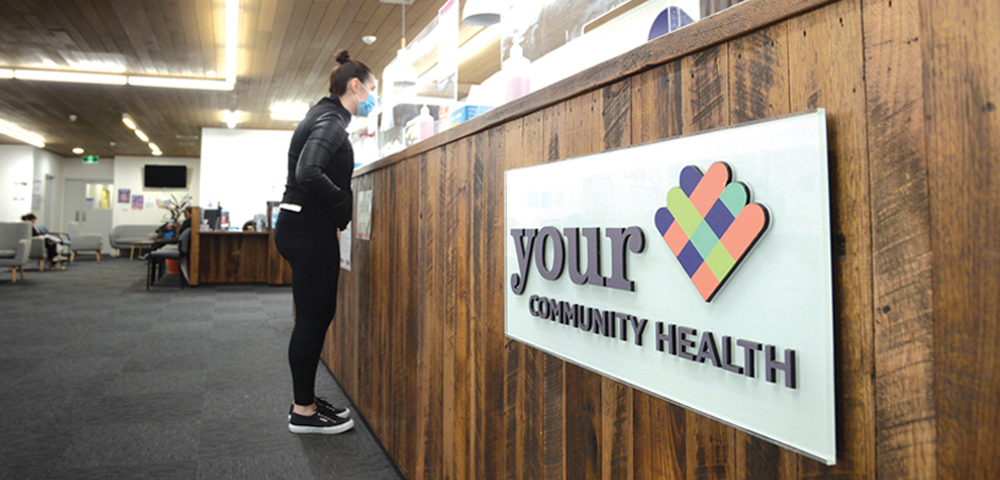
Georgie brings sweet Harman-y to beyondblue

IF you had told Georgie Harman when she was a child that she would become the leader of one of Australia’s most recognised not-for-profits, she would not have believed you.
Even in her late 20s she would have laughed at you.
But as she is about to celebrate her second anniversary as the chief executive of the mental health organisation beyondblue, Harman couldn’t be happier where she has ended up — even if her path to the top was unconventional.
While Harman has thrown herself into roles she wasn’t necessarily qualified to do through-out her career, she says her simple approach of “trusting your guts”, applying common sense and building good relationships led her into landing “one of the best jobs in Australia”.
The 46-year-old graduated from university in England with degrees in history and art history purely out of a personal fascination for those subjects, knowing she would never work in those fields. As soon as she graduated, Harman moved to London and became a paralegal at one of the city’s top law firms.
“I didn’t really know what I wanted to do,” she tells Star Observer. “But got paid very well, I used to save the money up and then go travelling.”
It was after working at the law firm for for four years that she decided to “stop buggerising around” and made a decision on what she wanted to do. By this stage, Harman had already been volunteering for several years with HIV charity, the Terrence Higgins Trust, when she had the revelation she wanted to work in the community sector in order to “give something back”.
She quickly landed a gig as the national sales and marketing manager for the Crafts Council UK, where she worked until she decided to throw her hat in the ring as the national fundraising director for Crusaid, the UK’s HIV fundraising organisation.
“I thought: ‘I could give that a go’. So I applied, I got the job, I was there about three years and I loved it,” she recalls.
“My major focus was on fundraising at a time when HIV and AIDS was still very stigmatised, it was really not talked about, and very much seen as a gay man’s disease.”
But then almost 20 years ago, a major event would occur in Harman’s life, which would go on to benefit Australia’s own HIV community.
“I met the woman I fell in love with and came out to Australia. I did the whole ‘dropped everything, sold everything, moved to the other side of the world’, no job, just kind of followed my heart and didn’t really think about it. Which is how I live my life really,” she says. “I think, you’ve got to do these things, I’m a great believer in following your guts.”
Only a couple of months after moving to Sydney, Harman became the first executive director of the Bobby Goldsmith Foundation (BGF) — one of Australia’s oldest HIV organisations — and in her first days in the top job was photographed for the front page of the then-named Sydney Star Observer.
“I was the inaugural executive director there at a time when they were transitioning from a hands-on board to a governance board,” she explains.
“They were employing a proper CEO and wanting to take the organisation on a change journey away from its traditional role.
“So whilst I was there we introduced a financial counselling service, we introduced housing support services and an employment support service which was quite a big change… and we really lifted our game on fundraising.”
After four years of working at BGF, Harman worked for herself for a while. Soon enough, she received a call from former ACON chief executive Robert Griew, who was working as the CEO of Northern Territory Health and wanted Harman on his team in the Top End.
Two days later, Harman moved to Darwin to help the NT with change management and a massive reform agenda in its health sector.
“The Northern Territory is an extraordinary place, it’s so unlike any other part of Australia. Culturally it’s very interesting and very diverse,” she says.
“And that’s where you really start to see how health systems and community services can help or fail people. The population is very small, there’s huge health challenges, it’s a very dispersed population and they have third world diseases that you don’t see anywhere else in Australia.”
In 2005, amid the chaos of more bombings in Bali, Darwin became the epicentre for inter- national media as many of the injured had been transported there for treatment. During this time, Harman received a phone call from a headhunter about a health role in Canberra.
“I was actually quite rude to her. I was like: ‘I don’t have time for this, no I’m not interested in working for the federal government’,” she admits.
“She was very good and she persisted, and we laugh about it now.”
“[It] gets stuff done, that was the stuff that really stuck with me.
“I think the work we do is so important. We don’t have all the answers, there’s still so much to do and I think that’s what motivates me. We can’t be complacent, we can’t afford to be arrogant.”
Harman recalls a dinner event she was attending recently where a man she was sit- ting with became emotional and thanked her for the work beyondblue does.
“His daughter was really struggling and decided she wanted to end her life and took certain actions. And then realised she didn’t want to die and called our support service and we got an ambulance out there and she’s now doing really well,” she says.
“It’s stories like that that make you very proud and privileged to have the role that you have and remind you every day of the need to continually do more and not sit on your hands and say we’re doing a great job.
“We save lives everyday. Which is an extraordinary responsibility and joy when you are able to save someone’s life.”
Affectionately known around the beyondblue offices as Tigger for her unbridled enthusiasm, Harman has always had a tendency to throw herself into new challenges.
“The formula is pretty simple in my view. It really comes down to common sense and good relationships,” she says. “If you don’t know what to do, ask someone, watch people you admire, ask questions. And work hard.”









